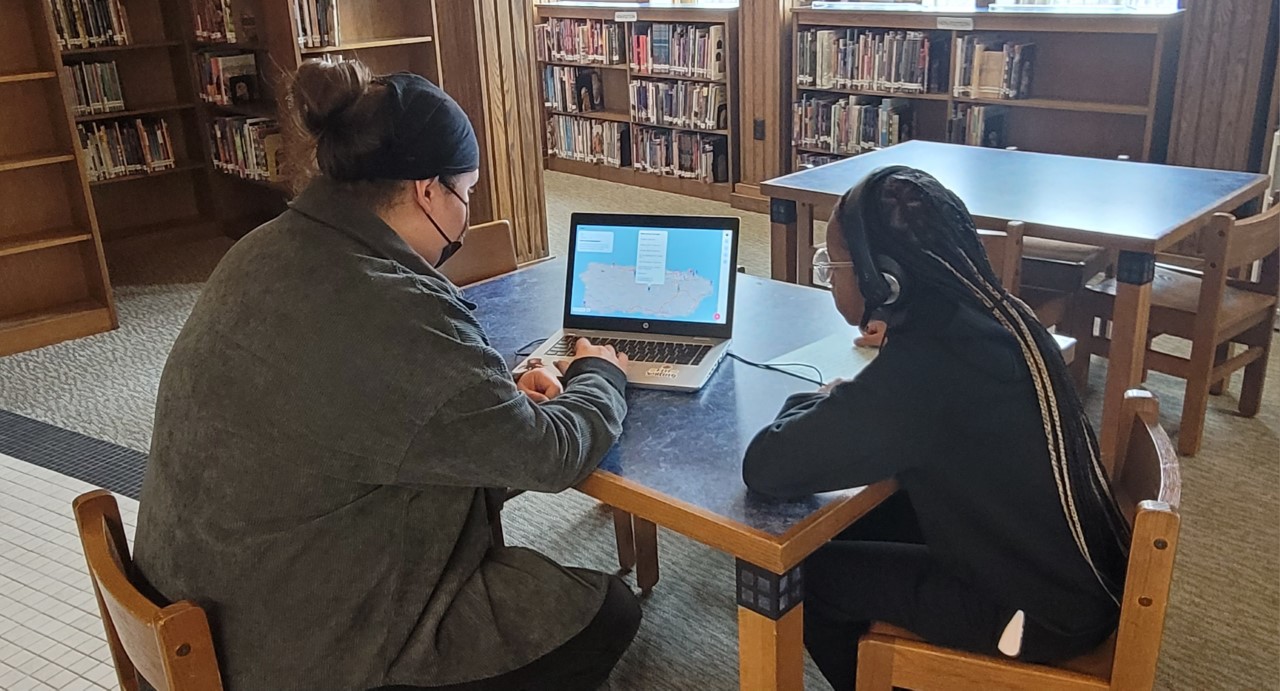STEM @ Blodgett Students Create Podcasts Highlighting their Identities
 I hear the ocean waves and birds chirping and it’s so peaceful.
I hear the ocean waves and birds chirping and it’s so peaceful.I pretended that I could speak English when I was little, but I grew up speaking Spanish.
I believe I can chase my dreams. I want to be a teacher.
I will save Puerto Rico by saying maybe they can leave until the hurricane is over.
I worry that the hurricanes won’t leave. I worry that they will ruin their hard work.
Syracuse STEM @ Blodgett seventh grade student Shakiaris Lind wrote “I’m Puerto Rican and No One Can Change That” as part of a class project, aimed at helping students celebrate and share their family’s cultural identity.
English as a New Language teacher Alysha Bates said she was hoping her students would gain a sense of self-awareness by engaging in some introspection. The lesson, which she titled “Place and Displacement Podcast,” was inspired by reading through Poet Laureate Joy Harjo’s ‘Living Nations, Living Words – A Map of First Peoples Poetry’ website.
The monthlong project she developed first required students to choose one of the First Nations poets from the map, taking notes on the poet’s biographical information and reading, annotating, and analyzing the poem that their chosen poet wrote. Then, the students used that poem as a mentor text to write their own “I Am” poems. Students were asked to identify places their family is from, considering how those places have impacted who they are and how they think about themselves.
“I wanted them to identify how their connections to different places have impacted who they are as people,” Ms. Bates said. “This project was ultimately a way for my ENL students' voices to be heard – a way for them to develop the confidence to speak their mind and speak their truth. I am so proud of the work that they have done, and of the dedication that they have shown to creating the best poem that they can!”
After writing their poems, students were tasked with recording it as their own ‘podcast.’ Their recordings were then uploaded to an online map, where students could pinpoint where their family is from; as well as listen to their classmates’ recordings. On a separate webpage, they were encouraged to leave podcast reviews – feedback in response to hearing their classmates’ pieces.
“There were certain aspects of the poem writing process which they struggled with – namely, turning their planning pages into a poem,” Ms. Bates recalled. “But ultimately, they enjoyed the poetry drafting process once they got the ball rolling. Once they reached the point where they had to record their poems, there were some students who felt nervous about reading out loud. Once they saw others recording, I saw a change. They began supporting and celebrating each other, and many of them were excited to share their poetry podcast ‘episode’ with their friends and family.”
“My mom and dad had never written a poem, so I’m the first person in my family to write a poem,” Shakiaris added. “My mom cried when I read it to her – she loved it.”
While Shakiaris was born in the United States, she said she feels strongly connected to her Puerto Rican heritage.
“I loved this project because I loved being able to show off that I’m Puerto Rican,” she said. “I really love Puerto Rico because it’s my culture. I love the way life is there. There’s so much to do – dancing, eating. It’s a community where they open their hands to you. If you go there, they’re going to love you like you’re their own kid. My classmates were inspired by my story because some of them are also from Puerto Rico. Some of them understand Spanish but can’t speak it. There’s a lot of people who are from there but only speak Spanish. You can learn a lot about other people and their culture when we open up like this.”
Angel Velez, whose family is American, Italian, and Dominican, said the challenge of this project was worth it in the end.
“I’ve never written a poem before – I don’t write a lot – so it was hard for me,” he explained. “But I’m happy about how it ended up. My favorite part was getting to talk about my mom and dad. I didn’t share it with them, but I think they would love it, and I’m proud of what I wrote. I learned about my classmates from this project. Most of them are from Puerto Rico, and some of them have families over there still. It’s important to learn more about each other so we can get to know each other better!”
To hear the students’ recordings, check out their “Place and Displacement” podcasts at: https://scsdpl.padlet.org/ABATES27/PlacesPodcast. Thank you to Ms. Bates for leading such an engaging activity for her scholars!


